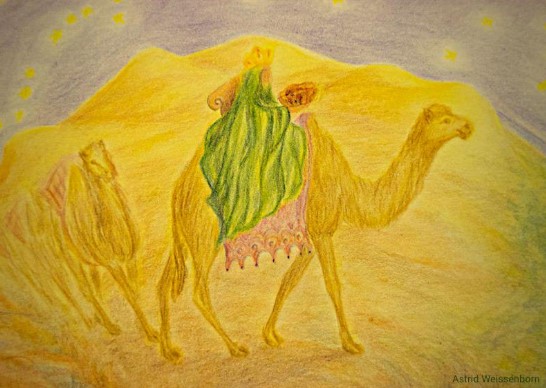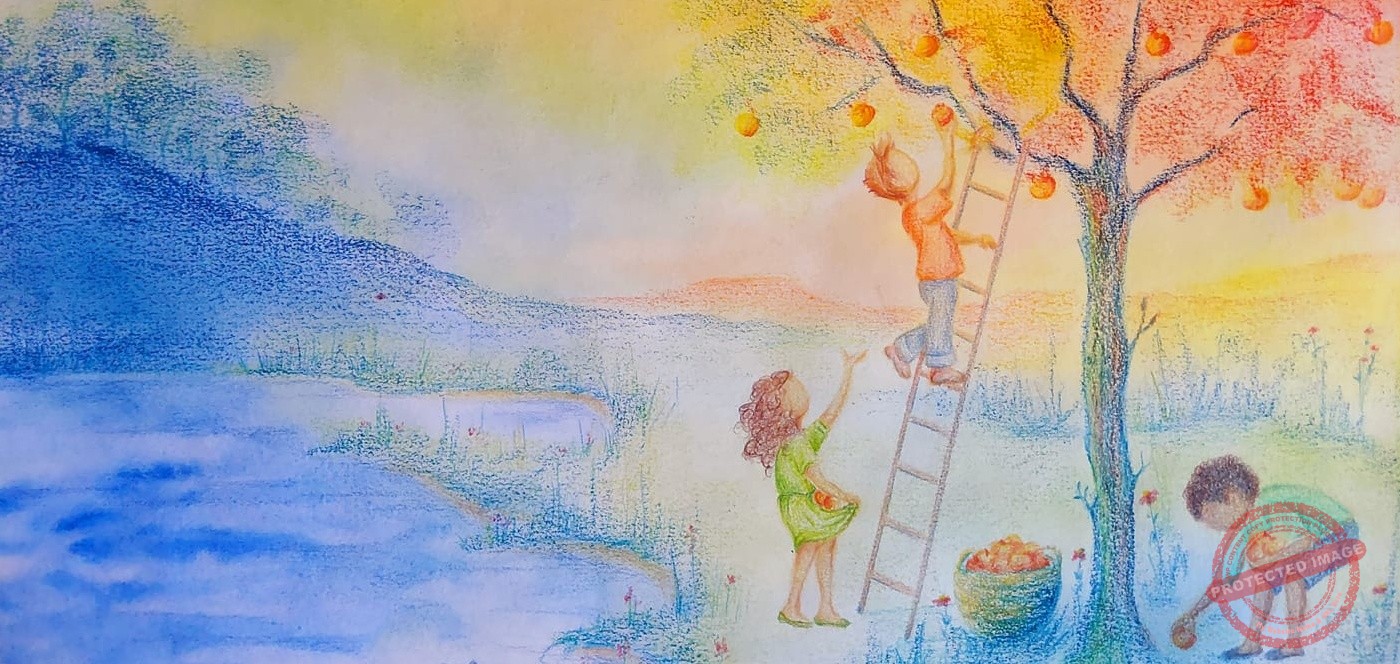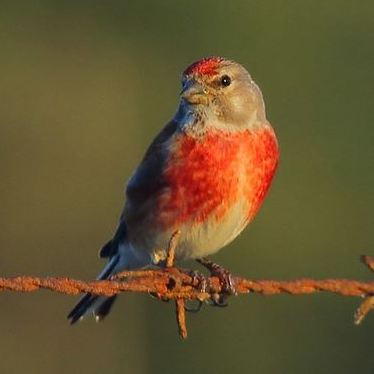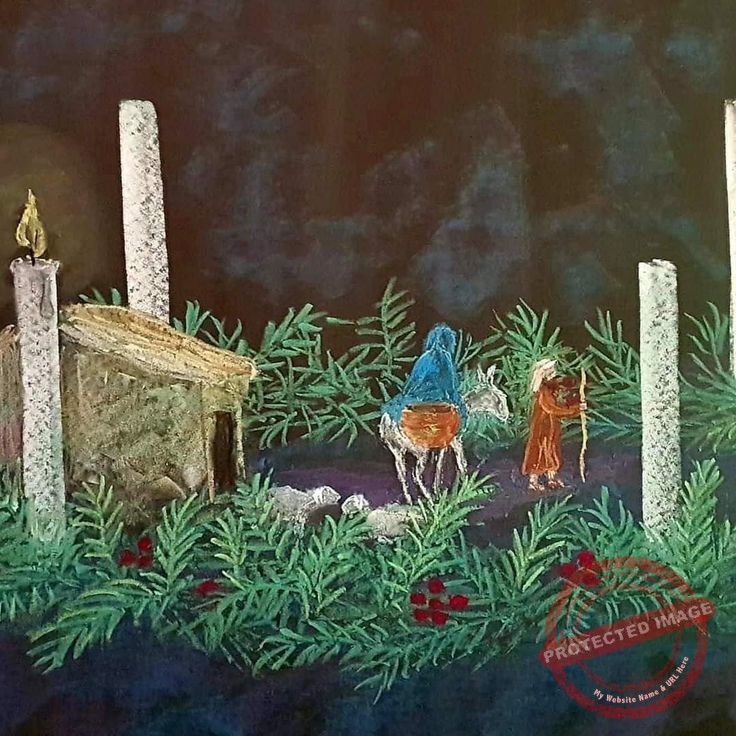[print-me target="body"]
7 short stories by Georg Dreissig
Christmas mice
1. WHY THE DONKEY DIDN'T WANT TO STOP
Donkeys are very stubborn animals. They are strong and persevering, and can carry very heavy loads. But sometimes they just don't feel like it and it's no use asking or fighting with them; if they don't want to obey, they won't obey. If you want to force them to work, they dig their hooves into the ground, and you can push or pull, but you can't move them. When you're desperate, it can happen that your stubbornness suddenly disappears - as if by magic - and your donkey returns to being the dearest, most helpful and faithful creature you can imagine.
For it was also like that with Maria and José's donkey, and the journey to Belém would have been even more difficult and long, if the donkey hadn't turned into a docile and peaceful pack animal. And it happened as follows:
José was loading the donkey with the few belongings they would need on the trip to Belém, and the donkey kept quiet, and it seemed to be the most docile and lovable animal in all of Nazaré. But when Joseph took the rope to pull him, he stalled and didn't want to take a step forward. José tried to convince him with caresses and then with threats: the donkey stuck its hooves in the ground and didn't move. So Mary tried her luck, stroked her between the ears and asked her to come, please, because the way to Bethlehem was long and they would have to hurry. But the donkey remained stuck and didn't want to talk. In this predicament, the Angel Gabriel intervened. Without Mary and Joseph having seen him, he approached the donkey and said: “You are so small and weak that you have every reason to not want to go to Bethlehem, because the way will certainly be very difficult for you. I'm going to call some Angels to carry your load, so you can stay here. It only pities me – added the Angel, lamenting – that you cannot then hear the Angels singing, when the Child Jesus is born, nor can you taste the sweet hay on which the Child will be lying…”
Angels singing? sweet hay? And he's here so silly, stuck, in danger of losing the best things in the world? The donkey pricked up its ears and listened, as if the Angels' song could already be heard. The muzzle he stretched in the air, sniffing, because it seemed that the scent of sweet hay was already coming to meet him. Totally forgot to pack. The donkey didn't even want to follow Mary and Joseph obediently; no, he ran happily ahead and couldn't wait to get to Bethlehem. At night, he would hardly stop to rest, and in the morning, before sunrise, he would already begin to bray "Hin-hon!", which means: "Rise, let's go quickly to Bethlehem, to the singing Angels and the hay. sweet. There is no time to lose!"
Yes, that's how a donkey can sometimes transform, if he listens, very attentive, and listens to what the Angel says to him.
2. WHAT THE SPIDER DID TO MARY
One night, Mary and Joseph stayed in a cave for the night. As they entered, José saw a spider crawling around and wanted to scare it away with his staff. But at that moment, Mary said gently: “Oh, Joseph, leave this dear little animal. I am not afraid of beings created by God, and there is room for all of us here!” Then they lay down to rest.
That night, a steady wind blew. He wanted, before the Baby Jesus was born, to wipe away all the stars in the sky soon, so that their golden glow would shine on Christmas night. The wind also blew inside the cave, and the Divine Mother felt so cold that she could barely close her eyes, despite wrapping herself in her mantle of stars. José had long ago fallen asleep and hadn't realized how chilled she felt.
But someone noticed Maria's condition: it was the little spider. She had enfolded the Divine Mother in her little heart, because Mary had spoken of her in such a loving way. So the spider set to work as best he could and made a fine and wonderful web at the entrance to the cave. You may perhaps think that a spider's web does not hold back the wind that comes from outside. But, as delicate as it was, the spider made a thick, waterproof curtain, which the violence of the wind could not penetrate. So Mary could still get a good night's sleep.
When, the next morning, she saw the fine spider's web at the entrance of the cave, she knew who had helped her and thanked the little animal from the heart, which had happily hidden in a crevice in the cave's rock.
3. WHY THE RABBITS TAIL IS WHITE
The little bunny ran playing in the meadow all summer, jumped as much as he wanted and, with so much joy in living, did a lot of somersaults. But when winter came, the meadow was covered with snow and the sun wanted to shine less and less, and the little rabbit went back into his den. This one was well lined with leaves and grass. The little bunny settled down with his tiny snout between his paws and tried to lie down and sleep until spring arrived. Only if the hunger got too strong did he leave his heated cave, but he tried to come back quickly when his little belly was full again.
One day the little bunny dreamed that an angel came to his den, pulled him lightly by the long ears to wake him up and spoke to him. The little bunny opened his eyes and looked around. He could no longer see the angel in his dream. But he still remembered his words: “There are two poor people who have lost their way in this snow. Run and help them find him. Your little nose will lead you to safety. And indeed it was! Not far from there, the little rabbit saw the two: a man and a woman, and with them a donkey. The man looked around looking for the path, but he didn't see him, because everything was covered in snow. The little rabbit, however, smelled smoke, which rose from the chimneys of the houses that were hidden in a lowland. He quickly jumped over the snow to Mary and Joseph, got up on his hind legs, and bounded off toward the village. When he turned back, he saw that people were still in the same place, looking at him in amazement. He then walked back to them, once again stood on his hind legs, then did somersaults that marked a small path in the snow. Then Mary and Joseph understood what the little rabbit meant and followed him. Jumping and jumping, the little rabbit ran ahead until they could see the village. There, the little bunny stopped and happily shook his long ears. And how pleased he was when Joseph thanked him with all his heart! But he was even happier when the dear Divine Mother bent down to him, caressed him gently and shook the snow from his fur, from all of his fur; only on the tip of the tail was a little snow. That's how the little tail was still white with snow, when the little bunny finally jumped into its warm den.
But when spring arrived, and the snow outside had already melted, the rabbit's tail remained white, and this happens to all rabbits to this day. It's the memory of that time when a little rabbit guided Mary and Joseph safely through the snow.
4. THE SQUIRREL'S PROVISION
In the fall, the squirrel had diligently gathered nuts. Here and there, he'd set up a pantry, carefully covering everything with leaves, dirt, and twigs, so that everything was protected and no one found out. There was only one problem. After having hidden all the nuts so well, the squirrel himself couldn't find them anymore. And when winter came, from Mother Nature's table, so richly laid out in summer, only a scant meal remained: the squirrel too had to go hungry, despite all its provision. How boring! Now he would have to do something he didn't like at all: he would have to risk getting something edible on the peasant farm.
So, it once happened that the squirrel witnessed an unpleasant event. Two poor people knocked on the door of a house, begging for alms, but were chased away screaming and screaming by the lady of the house. When the little squirrel saw the sadness on people's faces, he felt an ache in his little heart, wishing fervently that he could help them. Oh! If only he could find his larders!
Very quickly, he jumped back into the forest to search once more. And behold, suddenly everything became very easy. Not that he suddenly remembered. But wherever he had hidden his nuts, a little light now seemed to shine on the earth, showing him the way. So he dug and dug it up, stuffed his cheeks and hopped off after the poor wanderers. In fact, he was a little scared, but when he saw Mary and Joseph's sweet gaze, he lost all shyness. With a slight hop, he dropped two nuts for each of them along the way. Do you think this is too little for an empty belly? But what is given in love is always a little more than it seems. Maria and José thanked their little companion, ate the nuts, satisfying their hunger a little.
From then on, the little squirrel felt good. For whenever he searched his larders, little lights shone on the floor, so that he never again had to dig in vain for nuts.
5. PEDRO, THE WATCH DOG
Once again, on their way to Bethlehem, Mary and Joseph looked in vain for an inn for the night, and already believed they had to spend the night outdoors. José, then, in the half-light of twilight, saw a little house without light, far away. Coming closer, they realized that it was not a dwelling place for people, but a sheepfold. Either way, they would have a roof over their heads and some heat.
But Mary and Joseph hadn't counted on Peter.
Peter was the guard dog. During the day he helped the shepherd to lead the sheep to pasture, but at night he tended the fold so that no thief would approach the sheep. When Peter noticed people approaching, he jumped up, dragged the heavy chain to which he was tied, and barked menacingly, “Wow, whoop!” And that meant, “Watch out! Here you have to give me an account! Don't get too close!” Hearing those fierce barking, Joseph shrugged and turned around. “There is nothing we can do,” – he said to Maria – “it will be even more difficult to deal with this guard than with hard-hearted people.” Maria stopped too, and listened to Pedro's barking, which showed how pleased he was to keep those human beings away. But then Mary said: “Joseph, let's at least try! The nights are so cold, we won't be able to sleep without a roof over our heads.” And saying that, he walked calmly towards the sheepfold.
Peter then was beside himself with rage. It barked and jumped, attached to the current, towards the Divine Mother. But before Joseph could intervene with his staff, something unexpected happened. As if obeying an inaudible command, Pedro stopped barking, became quiet, looked at Maria, who had come within reach, and suddenly began wagging his tail, this way and that, this way and that. And the guard dog sprang up like a little goat to Maria and lay down on its back with its paws in the air. Maria bent down to stroke her belly. Pedro gave another growl as José approached, but Maria's loving hand reassured him again. “Look how this little rascal pulled his chain,” – said Mary to Joseph – his neck is all sore. And gently rubbed her delicate fingers over the wounds. Peter didn't even move.
Later, the dog fervently wished that he could enter the fold and be well with Mary; but as this was not possible, he lay down very close to the door, and his little heart leapt for joy, for that night he would also take care of the Divine Mother.
The next day, very early, the shepherd arrived to see how the sheep were doing. From a distance, however, he saw a scene that left him greatly astonished. The sheepfold door opened, and a man and a woman, followed by a donkey, came out. And Peter, the fierce guard dog, jumped up against them, wagging his tail, and licked the woman's hand. Meanwhile, the sheep bleat as if they were with someone they knew and were very fond of. The pastor watched all this, as if in a dream, and only after Mary and Joseph had left did he wake up from his thoughts. “Hey Peter,” – he said to the dog – “who were your guests?” Oh, if only he could understand the language of dogs! Peter would surely have told him who had spent the night in the fold.
But when the shepherd leaned over to the dog, he saw that the horrible wounds on his neck had healed during that night. And he was even more amazed!
6. THE SHEEP THAT DIDN'T WANT TO BE SHEARED
Snow-white was the cutest little lamb in the whole flock; the white of its wool shone much brighter than that of its companions. But that was also the only thing that set him apart. In the morning he always willingly accompanied the flock to the field, and in the evening he obediently returned to the fold. But when the time for shearing arrived with spring, all obedience suddenly ended. While the other sheep were being sheared, White-as-Snow would run away whenever someone wanted to grab his fleece, and he would bolt. No, he didn't want to give up his wool at all. Finally, the shepherd got tired of chasing the little sheep and decided: Snow-white will then have his winter wool. He will see how hot he is in the summer with his thick wool.
Then, when all the other sheep had gone out to the fields, shorn, while their wool, tied up in big bales, was sold in the market, Snow White continued to graze in his thick wool coat. No, actually it wasn't easy when summer came. From time to time the little lamb felt hot and, whenever he could, sought a shade to cool off. The shepherd really wanted to help his little lamb and rid him of his wool. But not even so White-as-Snow allowed the shepherd to approach with the groomer. Yes, but who did he want to save his wool for?
Winter came, and with it that night when Mary and Joseph spent the night in the stable. The next day, however, White-as-Snow was completely transformed, he stood in front of the shepherd and, with several signs, tried to make it clear that he wanted, in any case, to be sheared. “But this is not possible.” - said the shepherd - "Now in winter you need your wool." White-as-snow, however, did not stop begging and, as it was of no use, the little lamb became very sad, stopped eating and, even hearing good words, did not move anymore. “Then, let your will be done.” - The shepherd finally sighed and, taking the clipper, began to clip it. Snow-white remained very still, as if he had never been stubborn in his life, until his last white curl was cut. But so that the little lamb would not have to be so cold, the shepherd found an old coat and wool and put it on with it. Of the shorn wool, however, he made a little bundle and put it away, for it was still many months before the next sale in the market.
However, when the wool market season finally arrived, the little white wool bundle had been given away for quite some time. The shepherd himself had taken her to the Baby Jesus, who was born in a stable in Bethlehem. And finally, he found out who White-as-Snow had kept his beautiful white wool.
7. THE CHRISTMAS MICE
In Bethlehem there was an old and crumbling stable; in it dwelt Remus the ox. Hay and straw littered the ground, and in the corner was the manger, from which Remus ate. It was precisely in this stable that the Child Jesus was to come into the world. When the angel Gabriel took a look inside, he was startled and exclaimed: “In this filth and in this disorder the divine Child cannot see the light of the world. You, ox Remus, do something to make this place nice and tidy.” But the ox, pensive, just looked at the angel with its big round eyes, and continued to eat calmly. Here in the stable everything was as it had always been, and for him it could remain that way.
With what pleasure the angel Gabriel would have started to put the place in order himself! But this he could not do with his hands of light. Who would help you? Suddenly, he heard a thin, delicate squeak, and when he looked around the stable, he noticed a small mouse, who was looking at him from its hole in the corner. The little mouse had seen the angel and was now calling out to his children; they too were to see the heavenly appearance. Then Gabriel turned to the mice and asked: “Would you not help to tidy up the stable so that Baby Jesus will have a beautiful place to be born on Christmas Eve?” The mice didn't wait for him to ask twice. They quickly emerged from their hole, each grabbing a straw and quickly disappearing with it. Soon after, they appeared again, continued to tidy up, and in a very short time the old stable was beautiful and in order. Even the ox liked him better that way than before. Then Gabriel praised the mice and said, “Because you have helped me so diligently, you must be called the Christmas Mice, and when the Baby Jesus is born, you will be among the first to see him.” With that, the mice were happy and began to look forward to Christmas Eve.
credits
Realization of the Waldorf School Rudolf Steiner
Original Title: Das Licht in der Laterne – Adventskalender in Geschichten
Author: Georg Dreissig
Title in English: THE LIGHT IN THE LANTERN – An Advent Calendar in Stories
Translators: Ione Rosa Matera Veras, Mariliza Platzer and Edith Asbeck
Typing by Vanessa VB Mendes and Walkiria P. Cavalcanti – March 2013.
Review by Ruth Salles – September 2017.
***







